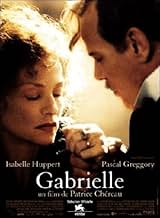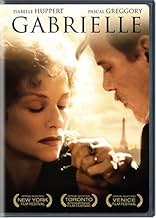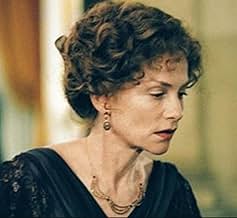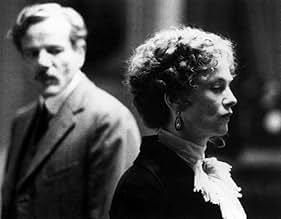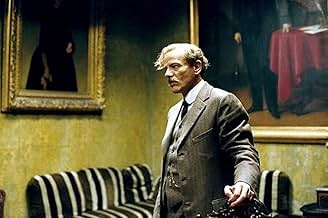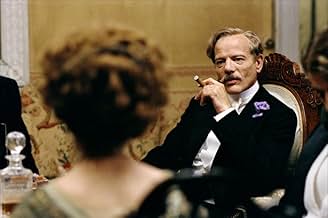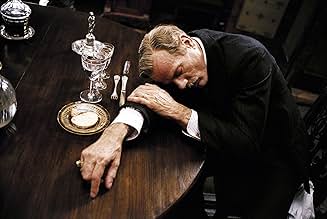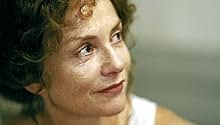Gabrielle
- 2005
- 1h 30min
NOTE IMDb
6,2/10
2,2 k
MA NOTE
Le mariage entre Gabrielle et Jean commence à s'effilocher après la découverte d'une lettre qui appartient à Gabrielle.Le mariage entre Gabrielle et Jean commence à s'effilocher après la découverte d'une lettre qui appartient à Gabrielle.Le mariage entre Gabrielle et Jean commence à s'effilocher après la découverte d'une lettre qui appartient à Gabrielle.
- Réalisation
- Scénario
- Casting principal
- Récompenses
- 3 victoires et 6 nominations au total
Florent Bigot de Nesles
- Invité
- (non crédité)
Philippe Calvario
- Guest
- (non crédité)
Avis à la une
9RNQ
Patrice Chéreau and his team continue to amaze. Their recent movies--"Intimacy" and "Son frère"--have been wild, and Isabelle Huppert has played some wild roles too. But "Gabrielle" is a masterpiece of control, an equal of the studio movies of Fritz Lang in the 1940s. A benchmark is Hitchcock's "Rebecca." Like those movies, every shot here, each turn of the head, is a statement of emotion (and a test of the actors' skill). Now not only music tells what the characters are doing, light is further nuanced with color. The almost-homage to black-and-white is astonishing, because it can also be lit into color, showing the characters' being forced to be here and now without escaping to old assumptions: a bitten lip bleeds red, a serving woman elaborately brings a softly glowing lamp upstairs. (A friend objects that the house has electricity, but the same friend puts candles on the dinner table, and this lamp has a purpose.) There's a thesis in Film Studies for the communicative devices of each scene and what is referenced, like the way there is a less flamboyant version of scenes in Ruiz's "Le temps retrouvé." But then being restrained is the theme, and the tension is extreme without any thunderstorm or overt thrill (a thrill for these characters might be the horror). If the source story was Conrad's homage to Henry James, here is a movie worthy of their capacity for narrative of the highest watchfulness and precision. Stay totally alert, movie goers.
Joseph Conrad wrote his novella, "The Return" in tribute to Henry James, whose "The Spolis of Poynton" inspired him to write about a man who regards people as objects of ownership-- and is gobsmacked when his most prized possession, his wife, walks out on him. On the page it's a tight little chamber piece, with overtones of Ibsen and Strindberg. On the screen the great Patrice Chereau turns it into something else -- an opera in which the images sing rather than the performers. Pascale Greggory is in top form as a haute bourgeois "man who has everything" whose smugness masks a total disdain for feeling. When the superb Isabelle Huppert leaves a note to say she's leaving, the brandy decanter he drops echoes like the sword of Siegfried in Chereau's famed production of Wagner's "Ring" cycle. (Fabio Vacchi's amazing Alban Berg-like score seals the deal on this aspect of the work.) The dramatic set-to that results finds our non-hero groping for words to speak to the feelings he's never experienced before -- longing, regret, and finally grief at the loss of a love he's never allowed himself to know.
As far from Merchant-Ivory as one can possibly imagine Chereau and production designer Olivier Radot (new to la famille Chereau) place the action in a museum-like mansion where a small army of servants move about at the service of this infernal couple and their friends. Scenes of their fashionable parties suggest the Verdurins in Proust with cinematographer Eric Gauthier indulging in a color palette that makes the screen seem like a Manet come to life.
Chereau is doubtless familiar with what Georges Bataille wrote of Manet: "A little superficial perhaps, but driven by inner forces that gave him no rest, Manet was possessed by a desire for something beyond his reach which he never fully understood and which left him for ever tantalized and unsatisfied, on the brink of nervous exhaustion." That's perfect description of the emotional heart of this very great film.
As far from Merchant-Ivory as one can possibly imagine Chereau and production designer Olivier Radot (new to la famille Chereau) place the action in a museum-like mansion where a small army of servants move about at the service of this infernal couple and their friends. Scenes of their fashionable parties suggest the Verdurins in Proust with cinematographer Eric Gauthier indulging in a color palette that makes the screen seem like a Manet come to life.
Chereau is doubtless familiar with what Georges Bataille wrote of Manet: "A little superficial perhaps, but driven by inner forces that gave him no rest, Manet was possessed by a desire for something beyond his reach which he never fully understood and which left him for ever tantalized and unsatisfied, on the brink of nervous exhaustion." That's perfect description of the emotional heart of this very great film.
I've been watching & thoroughly enjoying Isabelle Huppert's films since 'The Lacemaker'. This time, what struck me was the intensity of Huppert's next-to-passive, almost casually indifferent postures of contempt for her husband. It is because of her being so minimal and apathetic that her performance harnesses its power and devastation. And this is what enhances Greggory's reactive performance as being so complementary, that of a once smug now tortured soul who slips and struggles to re-grasp a heart turned cold. He's just left grabbing air in the end. The looks on the faces of the chorus, their social clique & the servants in the troubled Hervey household says it all.
Going in, I was reminded of another story of martial discord, David Hughes Jone's 'Betrayal' but 'Gabrielle' hit me as being more incisive and oppressive than anything I've seen adapted for Pinter. I don't need to state the obvious that parlor films of this variety appeal only to those with an acquired taste. As for me, I can only say that I prefer the ice cubes that go with my scotch jagged & stinging cold like the ingredients in this film.
Going in, I was reminded of another story of martial discord, David Hughes Jone's 'Betrayal' but 'Gabrielle' hit me as being more incisive and oppressive than anything I've seen adapted for Pinter. I don't need to state the obvious that parlor films of this variety appeal only to those with an acquired taste. As for me, I can only say that I prefer the ice cubes that go with my scotch jagged & stinging cold like the ingredients in this film.
This up close study of a marriage in crisis is Chereau at his subtle, rich best. The infant terrible of '82 Bayreuth has matured into a maestro of cinema.
Gabrielle wants more but is unwilling to spend the effort or pay the price to get it. Her husband wants less and will settle for nothing less than less. The machinery of their marriage was running so flawlessly that it required no work by either and only modest attention. Their relations were on automatic pilot and they both seemed massively content to keep it that way. Then the machinery, briefly but ruinously, goes crazy.
Huppert and Greggory are riveting. And, not counting the credits, run time is less than 90 minutes. Good artistic judgment there by Chereau. Any longer and this film could be painful for the viewer. Jim Smith
Gabrielle wants more but is unwilling to spend the effort or pay the price to get it. Her husband wants less and will settle for nothing less than less. The machinery of their marriage was running so flawlessly that it required no work by either and only modest attention. Their relations were on automatic pilot and they both seemed massively content to keep it that way. Then the machinery, briefly but ruinously, goes crazy.
Huppert and Greggory are riveting. And, not counting the credits, run time is less than 90 minutes. Good artistic judgment there by Chereau. Any longer and this film could be painful for the viewer. Jim Smith
Obviously we don't all like the same things. One commentator said it was all just talk, as if that were a bad thing. I happen to love language and words, and in particular love the French language. So that is the reason I rent a movie in French. I also have a very strong aversion to "action movies" where language is reduced to "Ow! Help! Duck!" On the other hand, movies like Gabrielle where minute movements of the psyche are explored in depth by minimalistic means, these are what grip me, move me, keep me interested. I do not really think the movie is like an opera -- it was more like a french play -- the delivery and velocity of the spoken word was very much in the style of french live theater.
My only caveat is that French-ness and Conrad seem a strange mix to me. There was another French movie that was made on a Conrad text, and I had a similar reaction. Conrad is not writing about French society. And yet the action has been transplanted to France. And it seems an entirely incongruous transplant to me -- plopping the joyless uprightness of puritanical England (the only place name mentioned is "West End Station" into a such a lively Latin culture which has always had a much more relaxed attitude towards love and sex... well,to me it's just incongruous.
Nevertheless, it was an cleverly crafted movie, and the musical score by Fabio Vacchi was unearthly beautiful.
My only caveat is that French-ness and Conrad seem a strange mix to me. There was another French movie that was made on a Conrad text, and I had a similar reaction. Conrad is not writing about French society. And yet the action has been transplanted to France. And it seems an entirely incongruous transplant to me -- plopping the joyless uprightness of puritanical England (the only place name mentioned is "West End Station" into a such a lively Latin culture which has always had a much more relaxed attitude towards love and sex... well,to me it's just incongruous.
Nevertheless, it was an cleverly crafted movie, and the musical score by Fabio Vacchi was unearthly beautiful.
Le saviez-vous
- ConnexionsReferenced in New York - Section criminelle: Blind Spot (2006)
Meilleurs choix
Connectez-vous pour évaluer et suivre la liste de favoris afin de recevoir des recommandations personnalisées
- How long is Gabrielle?Alimenté par Alexa
Détails
Box-office
- Montant brut aux États-Unis et au Canada
- 332 829 $US
- Week-end de sortie aux États-Unis et au Canada
- 30 676 $US
- 16 juil. 2006
- Montant brut mondial
- 2 775 311 $US
- Durée
- 1h 30min(90 min)
- Couleur
- Mixage
- Rapport de forme
- 2.35 : 1
Contribuer à cette page
Suggérer une modification ou ajouter du contenu manquant

